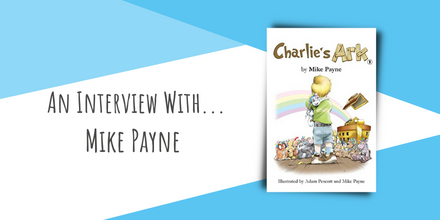Stuart MacBride was born in Dumbarton, and moved to Aberdeen at two years old with his parents and two younger brothers, where he attended Marchburn Primary School and then Middlefield Academy in later years. The family eventually moved to Westhill. After studying architecture at Herriot Watt University in Edinburgh but not particularly enjoying it, Stuart’s following career spanned from working offshore, graphic design, acting, being an undertaker, web design, a studio manager, and computer programming.
Whilst working in the IT sector, Stuart’s first book, Halfhead secured his first publishing deal. However, it was his other crime fiction novel, Cold Granite, which first featured DS Logan McRae, that grabbed Harper Collins’ interest and got Stuart signed on to a 3 book deal, and later extended to a 6 book deal. Stuart now lives in north-east Scotland with his wife and cat growing potatoes and “hanging about the house in his jammies”.
Hi Stuart,
Thank you for taking time out for World of Books to interview you. Our customers love a good crime fiction novel so we know they’ll be reading this enthusiastically!
Q: Ok, so we’ll start with an random question- what are your pet peeves?
– Ha – too many to list here. I have a whole zoo of them: adverbs, dialogue tags, people who don’t say “thank you” when you hold the door open for them, people who wear black shoes and black trousers with white socks… The list goes on, and on.
Q: How much research goes into your Logan McRae books? Are you on friendly terms with the Aberdeen police force, or are they slightly wary of you?
– How much research I do really depends on the book I’m writing. I tend to research specific things that I need to know, rather than doing a scatter-gun, ‘Research all the things!’ approach. But I certainly tap my forensic and pathology contacts on a very regular basis. As far as I know, Grampian Police are quite happy to be portrayed as human beings doing a difficult job in sometimes impossible conditions. The police tend to be ignored when things are going well, but as soon as something goes wrong they get it in the neck from the media. Usually without any sort of context about how difficult it is to do that job. And since I started writing I’ve been very lucky to make some good friends in the force.
Q: What is the weirdest question you’ve ever been asked?
– “Are you an alien?” Seriously, I was doing an event for the SALT book festival and they’d got this class of primary school children in to hear the first part of the talk, and their teacher encouraged them to ask a question before saying goodbye. And one little girl stuck up her hand and asked if I was an alien. Obviously I told her I was.
Q: You certainly had a lot of jobs throughout your career, what was the best one? And what did you want to be when you were younger?
– When I was little I wanted to be either an astronaut or a rock star. And if I’m being perfectly honest I still do. But in my pre-writing working life, I think the best jobs were the ones where we had a good team of people to bounce ideas off and have fun with. Being a fulltime writer, one of the hardest things I’ve had to adapt to is working on my own for 90% of the time.
Q: What book are you currently reading?
– I’ve just finished rereading SEXUAL HOMICIDES, PATTERNS AND MOTIVES – one of the FBI training manuals – as part of the research for the next book, and just about to start Birdsong by Sebastian Faulks.
Q: Are you friendly with other crime writers? Or is there a certain amount of rivalry you have to acknowledge?
– There’s a bit of a myth that all crime writers are lovely, but in real life we’re just like everyone else. There are some lovely ones I speak to regularly and are good friends, and others you wouldn’t want to be stuck in a lift with for more than thirty seconds. Unless you had a baseball bat to beat them unconscious with. But for the majority, another writer’s success is something to celebrate, not be jealous of. So we’re always very chuffed when someone’s got a new film deal, or been shortlisted for an award. Which is lovely.
Q: If you could have three wishes what would they be?
– World peace (well, you have to say that, don’t you), the secret to making cold fusion work, and a spaceship!
Q: Your new book, Birthdays for the Dead is out in January 2012. It’s a completely stand-alone novel, with no “hint, sniff or sneeze” of Logan McRae and his crew (for the latest instalment of these adventures, grab a copy of Shatter the Bones which was released in January 2011). The novel tells the story of Detective Constable Ash Henderson whose 13 year old daughter is abducted, and who he receives a picture of being tortured each year she is gone. You said that you have been wanting to write this story for over three years, and it certainly hints at being as gruesome and tense as your other novels. Why has this story taken three years to be published? And is it sometimes difficult to switch off from such a dark storyline existing in your imagination for so long?
– The reason it took so long to get around to is that I needed an appropriate place to take a break from Logan. He gets older in real time, so between the end of SHATTER THE BONES and the start of the book I’m currently writing, two years will have passed in Logan’s world. That means he gets a welcome break from me – and let’s face it, he needs one – and can try to get over some of the horrible things I’ve done to him over the last seven books. And this was just the right time to take that break. He’ll be a much happier character having had the time off.
As for the switching off, I’ve got lots and lots of plots bubbling away in the back of my brain. Sometimes they just need time to mature, darken, and deepen. Like worcester sauce. It just makes it all the tastier.
Q: A day in the life of Stuart MacBride?
– Remarkably boring: I get up, I talk to my cat, Grendel, have breakfast, walk to the study, switch on the computer, sit down and write. Break for lunch, then back to the computer again. It’s not exactly a whirlwind of thrills and international wonderment. On a special day I’ll have a cup of tea and a biscuit!
Q: And finally (this question won’t be a surprise to World of Books customers), our company is dedicated to providing good-quality second-hand books to the public. In a world with an ever-growing digital media base, and increasing environmental concerns, do you believe in the importance of giving each physical book the chance of a new home?
– I’ve never thrown a book out in my life, we have boxes of the things all over the house. And I like to rescue books from library sales as well. But if I enjoy the book, I make a point of buying a book by that author from a first-hand local bookshop too. If we don’t support local bookshops they’ll disappear. And if we don’t buy new books from time to time, the authors will too.
Second-hand and charity bookshops are terrific places to discover new writers, as are libraries, but if we want to keep reading great books we need to support the industry too. Otherwise we’ll have nothing left but a dwindling pile of recycled books, and the self-published unedited swamp of eBooks on the internet.
How awful does that sound?
Feel the need to catch up with Logan McRae? Visit our site and pick up a book from Stuart’s series today! And don’t forget to check out Birthdays for the Dead out in bookstores 5th January 2012, you can also visit Stuart Macbride’s website here.




1 Comment
Good interview. Nothing wrong with physical books at all.